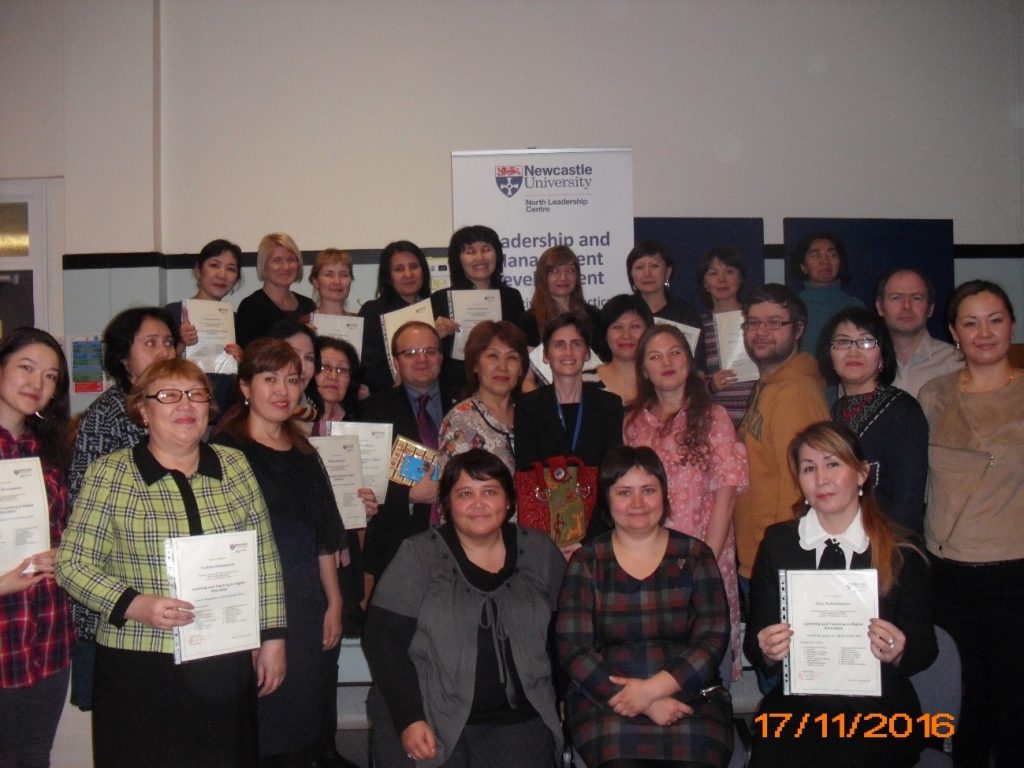Dr Roza Flurovna Zhussupova, Associate Professor of Pedagogy at the Eurasian National University, Astana, was one of twenty-five academics who participated in the Learning and Teaching in Higher Education programme (LTHE) from 9-17 November 2016. LTHE is hosted and facilitated by staff from ECLS and managed through the Newcastle University North Leadership Centre. In this blog post, Roza reflects on the aims of the programme and its impact on her professional practice.
The aims of this programme were to enhance university teachers’ pedagogical specialties in the field of modern teaching and learning technologies in order to increase the competitiveness of the higher education system in Kazakhstan. Moreover, the LTHE programme was designed by using the principles of blended learning in order to maximize the flexibility and accessibility of our learning opportunities. We were asked to reflect on our learning in conjunction with digital resources on Moodle.
During this programme we experienced very significant lectures and sessions, such as Principles and Practice of Teaching in Groups presenting by Dr Richard Parker and Mr Dave Lumsdon, and Writing Skills for Academics conducting by Dr Rachel Lofthouse. During these creative sessions we considered scenarios in an organized manner using discussion and resource investigation techniques, developed the use of research and ICT skills, analysed and discussed research information using a variety of models to feedback, developed skills in group working by managing group meetings and recording them using a scribe to note all actions and decisions. We discussed a good way to engage students, peers, policy makers and public in academic writing. We were introduced how to use the SOLO taxonomy to develop better writing. On the top of it we wrote a blog post.
The most esteemed session was Preparing to Lecture and Interactive Learning delivering by Dr Anna Reid who gave us practical experience of very useful and important activities as “Seating for Behaviour” and “Soldiers’ Lines”. Dr Reid taught me how to develop analytical habits while preparing to lectures, how to organize discussions while lecturing and adapt problem tasks to situations. I highly appreciate her new view on the expansion of students’ intellectual abilities. Dr Anna Reid is an excellent lecturer and has inspired me to continue learning and teaching with an open and positive mind in my country.
Project Supervision was presented by Dr Pam Woolner. Here, we considered the general requirements of supervision, including opportunities for participants, highlighting the aims and processes of supervision within institutions or disciplines. The main activity was group discussions of real life supervising scenarios. One of the techniques discussed in this module was Project Management used as a Tool for Learning. The task to prepare a template for an educational project charter was an additional experience in my project work.
On-line learning was demonstrated by Ms Eleanor Gordon intending to develop the ability to apply the latest information technologies in professional activity for teachers. She showed how to use information and communication technologies in modern educational practice, which become commonplace entities in all aspects of life. Additionally, she introduced us using Twitter, OneNote, Workspaces, Mind42 and Word Press that have fundamentally changed my practices and procedures of the teaching process.
As a result of the programme I can conclude that I now know and understand the main conceptions and issues in the range of learnt teaching modules, in order to develop self-analysis and self-assessment. This programme has definitely given me knowledge in innovative and contemporary teaching methods and approaches in higher education so that I can improve the quality of teaching practice in my university. I am determined to take forward ideas of online teaching, microteaching, interactive lecturing, and professional development into my teaching.
On behalf of the group I am very thankful to everybody from ECLS and the North Leadership Centre for your knowledge and support. As a representative of the Theory and Practice of Foreign Languages Department within the Faculty of Philology, I enjoyed the LTHE programme immensely and hope for close co-operation in the future.

